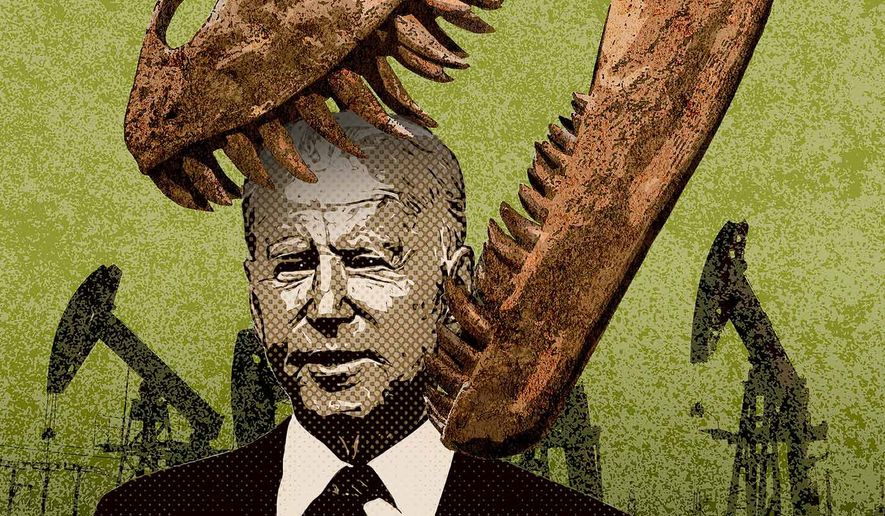OPINION:
After months of debate, the U.S. House of Representatives passed President Joe Biden’s ambitious $2 trillion budget reconciliation bill. The legislation seeks to spend approximately $500 billion on climate initiatives, the largest such investment in U.S. history. While Washington’s renewed effort to “go green” is commendable, lawmakers should be cautious not to cede ground to the false narrative that fossil fuels are no longer a vital component of the United States’ energy portfolio.
In pushing the President’s climate agenda, the White House and its allies on Capitol Hill have frequently painted a rosy outlook of a future supplied entirely by “clean” energy. However, even Mr. Biden seems to understand that transition is dependent on traditional energy resources, namely oil and natural gas. During the U.N. global climate summit, the President rightly said: “The idea we’re going to be able to move to renewable energy overnight [is] just not rational.”
Yet, while the President may acknowledge the crucial role of fossil fuels, his actions speak even louder. Upon taking office, the Biden Administration issued a moratorium on oil and gas leases on federal lands, which account for nearly 10% of domestic production. Last month the White House worked with Democrats in Congress to introduce a bill that would saddle fossil fuel producers with more than $100 billion in higher taxes over the next decade.
The White House’s agenda seems to be more consumed with appeasing far-left environmental activists than advancing an energy strategy that will get us to carbon neutrality. That’s because the transition to carbon neutrality will require an all-of-the-above approach. Limiting domestic oil and gas production before renewables are ready to replace them is a dangerous gambit — one that could very well undercut the Administration’s goals.
Amid Washington’s growing hostility towards fossil fuel producers, consumers have been burdened with skyrocketing energy prices. AAA reported last month that Americans now pay $17 more, on average, to fill up their vehicles compared to last year. Areas like the Northeast, where energy futures are trading about three times higher for January-February 2022 compared to recent years, are now relying more on higher-polluting fuels like heating oil due to insufficient natural gas infrastructure.
The White House has tried to pin these unwelcome realities on the oil and gas industry. Last month, for example, Press Secretary Jen Psaki argued that rising gasoline prices make “an even stronger case for doubling down” on clean energy investments.
This rhetoric ignores the reality that American-produced oil and natural gas are imperative to the United States’ energy future. Fossil fuels supply about 80% of U.S. demand, which is unlikely to change much in the near term. Most Americans understand this truth. A Pew Research Center survey this spring found that nearly two-thirds of U.S. adults (64%) support a mix of energy sources going forward—including oil, coal and natural gas, along with renewables.
One would hope that this commonsense logic would inform the White House’s and lawmakers’ policies. Reducing energy prices, which have a direct impact on economic growth, will require bolstering supply. Very simply, renewable energy capabilities are not developed enough to fill the gap created by limiting fossil fuel production. In other words, policymakers cannot punish traditional energy producers to curry favor with far-left environmentalists without our economy paying the price.
BlackRock CEO Larry Fink, who has been a vocal advocate for clean energy investment, understands that it should not be an either-or decision between oil and natural gas producers and emerging technologies. “Hydrocarbon companies are part of the solution, not the problem,” he told investors in November. “If we are not working with hydrocarbon companies, we will never get to net-zero.”
Let’s not forget, either, that renewable energy development has been plagued by the same NIMBYism that has dogged oil and gas producers for years. From solar farms in Nevada to offshore wind projects in New Jersey to hydro transmission lines in Maine—environmental activists have sought to derail nearly every type of energy development in every corner of the country. To borrow from the old adage, these ideologues want to have their energy and fight it too.
Mr. Biden deserves credit for his vision to create a cleaner energy future, and even more so for his apparent recognition that fossil fuels are critical to achieving it. However, he needs to build the political courage to stand up to activists and members of his party who are more concerned with punishing fossil fuel producers than stopping climate change. U.S. oil and gas are critical to our clean energy transition. Continually putting up roadblocks to their success won’t accelerate our progress to carbon neutrality — it will only deter it.
• Patrice Douglas is an attorney and former chairman of the Oklahoma Corporation Commission.




Please read our comment policy before commenting.